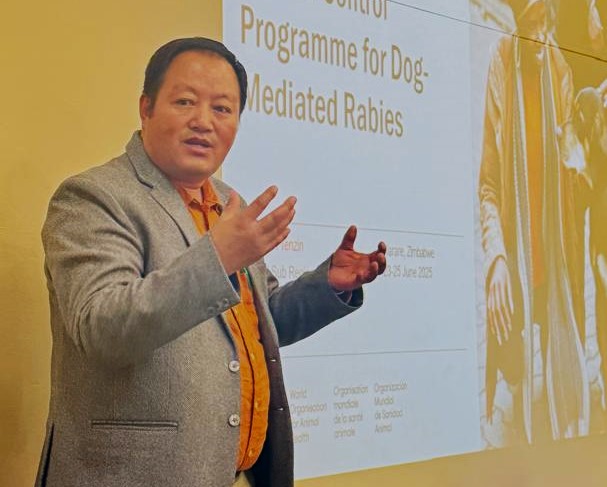
Participants during the workshop. Picture © T Tenzin (woah) 2025.
A three-day national consultative technical working group write-shop was held from 23–25 June 2025 in Harare, Zimbabwe, to review and finalise the National Strategic Plan (NSP) for dog-mediated rabies control in Zimbabwe. A total of 20 multisectoral technical officials participated, representing the Directorate of Veterinary Services (DVS), Human Health, Wildlife and Environment sectors, Animal Welfare Organisations, FAO, and WHO Zimbabwe.
The write-shop was organised by the Directorate of Veterinary Services (DVS) of Zimbabwe, with technical and financial support from the World Organisation for Animal Health (WOAH), Sub-Regional Representation for Southern Africa, based in Gaborone.
The Director for the Department of Veterinary Field Services, Directorate of Veterinary Services, Dr. Machakwa in his keynote address, highlighted rabies as not only a public health crisis but a deeply entrenched equity issue, affecting the children, and rural populations. Zimbabwe reaffirmed its commitment to the global call to eliminate dog-mediated human rabies deaths by 2030, led by a consortium of international organisations.
During the workshop, Dr Tenzin Tenzin from WOAH delivered a presentation on the global strategic plan “Zero by 30” and highlighted key components, including the United Against Rabies (UAR) Forum, rabies control Tools, proof-of-concept initiatives, WOAH international standards on rabies, the WOAH rabies vaccine bank, and the importance of rabies surveillance, data collection, and reporting. Dr Tenzin also briefed participants on the WOAH endorsement process of official control programme for dog-mediated rabies and the benefits of gaining international recognition and technical support for rabies elimination efforts.
The technical working group reviewed the draft NSP and finalised the document. Zimbabwe also plans to submit the NSP for WOAH endorsement.
A NSP for rabies is essential in effectively combating this deadly zoonotic disease. A comprehensive plan provides a clear roadmap for the control and eventual elimination of dog-mediated rabies, outlining specific targets, strategies, and interventions. These include mass dog vaccination, dog population management, robust surveillance systems, improved access to post-exposure prophylaxis for humans, and public awareness initiatives. Implementing such a Plan enables countries to concentrate their efforts on high-impact areas, significantly reducing the incidence of rabies and progressing toward its elimination by 2030.



